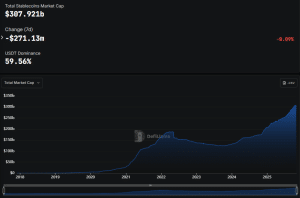- SAB adopts Chainlink’s CCIP and CRE to expand tokenization and cross-border finance tools.
- SAB and Wamid target $2.32T Saudi capital markets with blockchain-based tokenization plans.
- LINK price falls 2.43% to $22.99 despite higher trading volume and steady liquidity ratios.
Saudi Awwal Bank has added Chainlink’s Cross-Chain Interoperability Protocol (CCIP) and the Chainlink Runtime Environment (CRE) to its digital strategy. CCIP links assets and data across multiple blockchains, while CRE provides banks with a controlled framework to test and deploy new financial applications.
The lender, with more than $100 billion in assets, is applying the tools to tokenized assets, cross-border settlement, and automated credit platforms. The move signals that Chainlink’s infrastructure is being adopted at scale inside regulated finance.
Related: Chainlink’s Deal with SBI Is a Major Win, But Chart Shows LINK’s Battle at $27 Resistance
Wamid Partnership Aims at $2.32 Trillion Markets
In parallel, SAB signed an agreement with Wamid, a subsidiary of the Saudi Tadawul Group, to pilot tokenization of the Saudi Exchange’s $2.32 trillion capital markets. The focus is on equities and debt products, opening the door for blockchain-based issuance and settlement.
SAB has already executed the world’s first Islamic repo on distributed ledger technology, in collaboration with Oumla earlier this year. That transaction gave regulators a template for compliant on-chain contracts. The Wamid deal builds directly on that precedent, shifting from single-instrument pilots toward broader capital markets integration.
Saudi Blockchain Buildout Gains Pace
Saudi institutions are building multiple layers of digital infrastructure. Oumla is working with Avalanche to develop the Kingdom’s first domestically hosted Layer 1 blockchain. SAB’s Chainlink adoption adds an interoperability and execution layer on top.
Together, these projects are shaping a domestic framework for tokenization, with global connectivity added only where liquidity requires it.
LINK Price and Liquidity Snapshot
While institutional adoption progresses, Chainlink’s native token, LINK, recorded declines at the time of writing. The token traded at $22.99, a 2.43% decrease over 24 hours, according to CoinMarketCap data.
LINK’s market capitalization fell to $15.59 billion, though trading activity rose as 24-hour volume climbed 18.52% to $803.1 million. The fully diluted valuation was reported at $22.99 billion, supported by a maximum supply of 1 billion LINK and 678.09 million tokens in circulation.
Price action showed continued selling pressure, with LINK sliding from $23.63 to session lows near $22.90. The volume-to-market-cap ratio of 5.11% displayed steady liquidity, but the trend reflected market caution as the token tested support below $23.
Related: Chainlink Is Now the Official Pipeline for US Government Economic Data On-Chain
Disclaimer: The information presented in this article is for informational and educational purposes only. The article does not constitute financial advice or advice of any kind. Coin Edition is not responsible for any losses incurred as a result of the utilization of content, products, or services mentioned. Readers are advised to exercise caution before taking any action related to the company.
Source: https://coinedition.com/saudi-awwal-bank-chainlink-tokenization-link-price-analysis/


